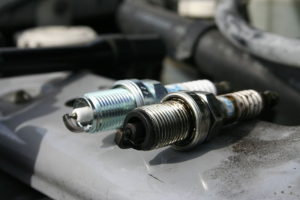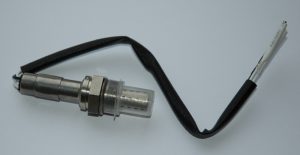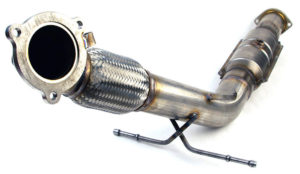Although our check engine lights are meant to help us diagnose problems with our car, more often than not, seeing that light pop up on our dash can leave us just as ignorant if not more so than before! With so many different issues that can be linked to that infamous light, how can drivers be expected to go down the list and find the one ailing their vehicle?
Fortunately for those dreading the idea of being left in the dark until their visit to the mechanic, there are a few common reasons that cause that light to rear its head. Read on for some of the more common issues linking back to that light and see if you can get a head start on discovering the cause of your car’s problem before having it confirmed with engine diagnostics.
 Spark Plugs
Spark Plugs
Damaged spark plugs are a very common sight for most mechanics and one of the first things checked when you car’s check engine light brightens up. For those a little lacking in their familiarity with how their car runs, the spark plugs are responsible for igniting the air and fuel in combustion chamber to ignite the vehicle when it starts. If these crucial components become worn down your car’s fuel economy can take a noticeable plummet. In addition, damaged spark plugs, if left unchecked for long, can go on to further damage other fixtures like catalytic converters and ignition coils.
If you notice your check engine light is followed by higher fuel consumption, a misfiring engine, and trouble starting your car, you might be looking at some damaged plugs that need some attention.
 Oxygen Sensor
Oxygen Sensor
Your oxygen sensor is what measures the amount of un-burned oxygen remaining in a car’s exhaust. If damaged, your engine can easily begin consuming more fuel than necessary to get it moving. In addition to the lost fuel economy, like the spark plugs, a damaged oxygen sensor can go on to damage other fixtures in the vehicle like the converter.
Unfortunately, a variety of symptoms pertaining to a damaged oxygen sensor are also experienced in the case of damaged spark plugs. If you’ve experienced rough engine idle and misfires or increased gas consumption along with you check engine light, it would be wise to visit a mechanic to get to the bottom of the cause.
 Catalytic Converter
Catalytic Converter
Without getting too technical, your catalytic converter is what converts harmful carbon monoxide into carbon dioxide. That being said, a malfunctioning converter is just as harmful to others around your vehicle as it is to you. If this happens to be what’s causing your check engine light to show, failing to have it checked can cause you to fail future emission tests and diminish your vehicle’s performance and lifespan.
Conclusion
It’s no surprise that your car is an infinitely complex piece of machinery. So much so that even tools like our check engine light only rule out a few prospective issues. If you notice that your vehicle is acting strangely and your dash is visited by some concerning lights, consider these three issues and receive the aid of a diligently trained mechanic to have them addressed and alleviated in no time flat!
Leave a Reply